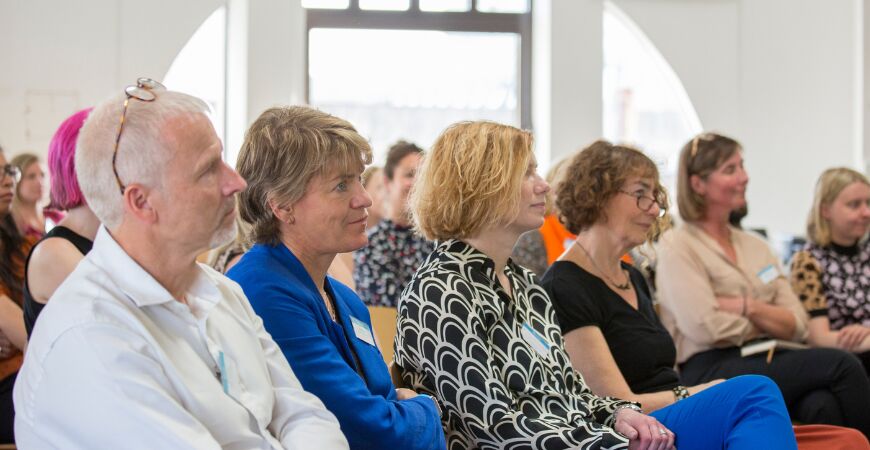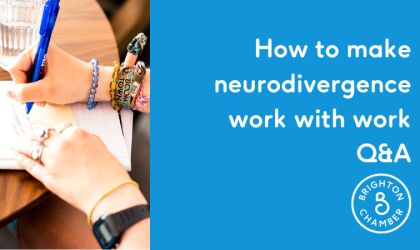

The menopause is a natural transition that 50% of the population will experience (and likely find their physical and emotional health impacted) – but, despite this it remains a largely taboo topic in the workplace – and only 11% of employers feel well equipped to support teams and colleagues experiencing the menopause.
In a recent Q&A, Pippa Halley, Project Lead for Menopause@Work at Here, and Laura Wood, Health Improvement Specialist at Brighton & Hove City Council, joined Amy Lishman, Head of Member Engagement & Deputy CEO at Brighton Chamber to talk about what businesses can do to support health and wellbeing at work, and what steps can be taken as a business or manager, in reducing the impact of menopause at work.
You can listen back to our recording, and find some key highlights and links from the discussion below.
What is menopause, and why is it important for us to talk about?
Half of the population will experience the menopause. Menopause is a natural progression through the life of an individual with female reproductive organs – commonly identifying as women, but it’s important to remember that menopause affects people identifying as any gender, including men or non-binary people. We need to make sure we’re not making that assumption when we’re talking about menopause.
1 in 10 people experiencing menopause leave their jobs due to menopause symptoms. Laura said that those recently surveyed about the menopause said they didn’t want to leave their jobs, but felt that they didn’t have a choice. There were also people surveyed who said, although they didn’t leave their jobs, they holding back from career progression and promotions – so the menopause was still having an impact on their jobs and career, even if they weren’t leaving work altogether.
They pointed out the imbalance here in menopause symptoms being addressed, giving an example of the allowances made at work for people who are pregnant. Why don’t we make the same kind of allowances for people experiencing the menopause?
What are the symptoms of the menopause?
Symptoms and their severity can vary from person to person – but for employers, it’s important to recognise the symptoms and their impact, both physically and psychologically.
The menopause causes an imbalance of hormones, which can cause symptoms of the menopause including hot flushes, headaches, low mood, sleep disruption, vaginal dryness, irregular periods and flooding (sudden and heavy periods). There are also commonly reported cognitive symptoms such as brain fog and anxiety.
There’s no one-size-fits-all solution for managing menopause symptoms. Some people find hormone replacement treatment (HRT) extremely helpful - while others find it doesn't help, or can't take it.
What’s the impact of the menopause in the workplace?
It’s important to create an open and supportive environment in the workplace for discussion around health and wellbeing, and the role of managers is key in facilitating these discussions.
Laura and Pippa gave an example of how experiencing the menopause can impact someone’s time at work. Someone who is experiencing frequent and heavy flooding might be anxious about leaking through their clothes, whether on public transport, in the office, or when out and about. This could cause them to have more sick days and absence from work; be late to work; or less engaged and productive when they are at work. If that person could work from home, how could the impact be reduced?
Creating a menopause supportive workplace environment
So how do we open these conversations in our teams, to create more supportive environments for people experiencing menopause in the workplace?
You could run an awareness campaign within the business; make use of resources for your teams; or simply just let your team know that you’ve taken training. This all helps to normalise the conversation about the menopause. And make sure that the men in your workplace are included in these discussions, because it’s important that everyone can help to normalise the conversation.
Education, awareness and empathy are key in creating a supportive work environment for those experiencing menopause – it’s all about understanding and accommodating people’s needs through open conversations.
What this all means for employment law
Menopause symptoms should be taken seriously, particularly if they have a significant impact on someone’s ability to do their job. Laura and Pippa recommended workplaces have risk assessments, and make necessary adjustments for individuals experiencing menopause symptoms. The Equality Human Rights Commission website has some handy resources to help with that here.
That being said, having a policy isn’t enough; your workplace’s culture needs to understand and accommodate your employees’ needs, so it’s important to include and consult your staff, to make sure your policies meet their needs.
Finding further resources
The Menopause@Work project is aimed at supporting small to medium sized businesses, as well as individuals, experiencing or affected by menopause. The project offers a free online platform with resources, information and training courses.
Menopause training and education is really important for teams, and Laura suggested making menopause training compulsory for line managers to ensure they’re equipped to have conversations about the menopause. The Menopause@Work platform, which includes resources for individuals and workplaces, aims to help bridge gaps in support for menopause in the city.
You can find out more about the Menopause@Work project and sign up here – it’s completely free for businesses. You can also find their events and training (including sessions aimed at line managers or business owners who are men or identify as men) here.
Also recommended by Laura and Pippa were resources like the Mind website for wellness action plans, age-friendly toolkits for discussing health and wellbeing, and a mid-life MOT toolkit. She pointed out that managers play a crucial role in creating a comfortable environment for employees to discuss their needs.
With special thanks to Pippa and Laura for sharing their expertise and insights at this Q&A.
For more expert Q&As with our members, head over to the Brighton Chamber Youtube channel.
And, to find other Q&A and learning events run by Brighton Chamber, head over to our events page.
If you want to contribute to the Chamber blog, contact us on hannah@brightonchamber.co.uk



